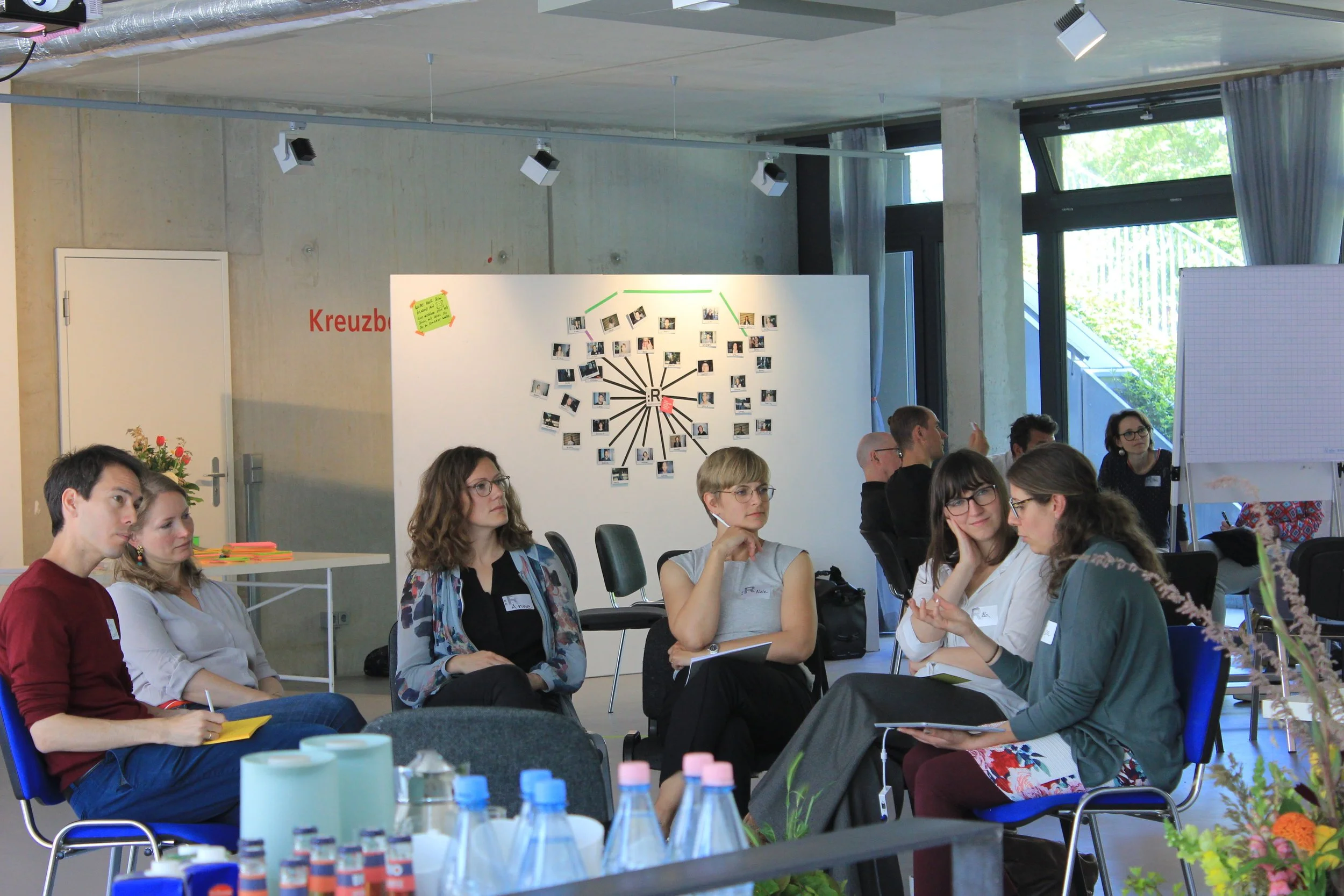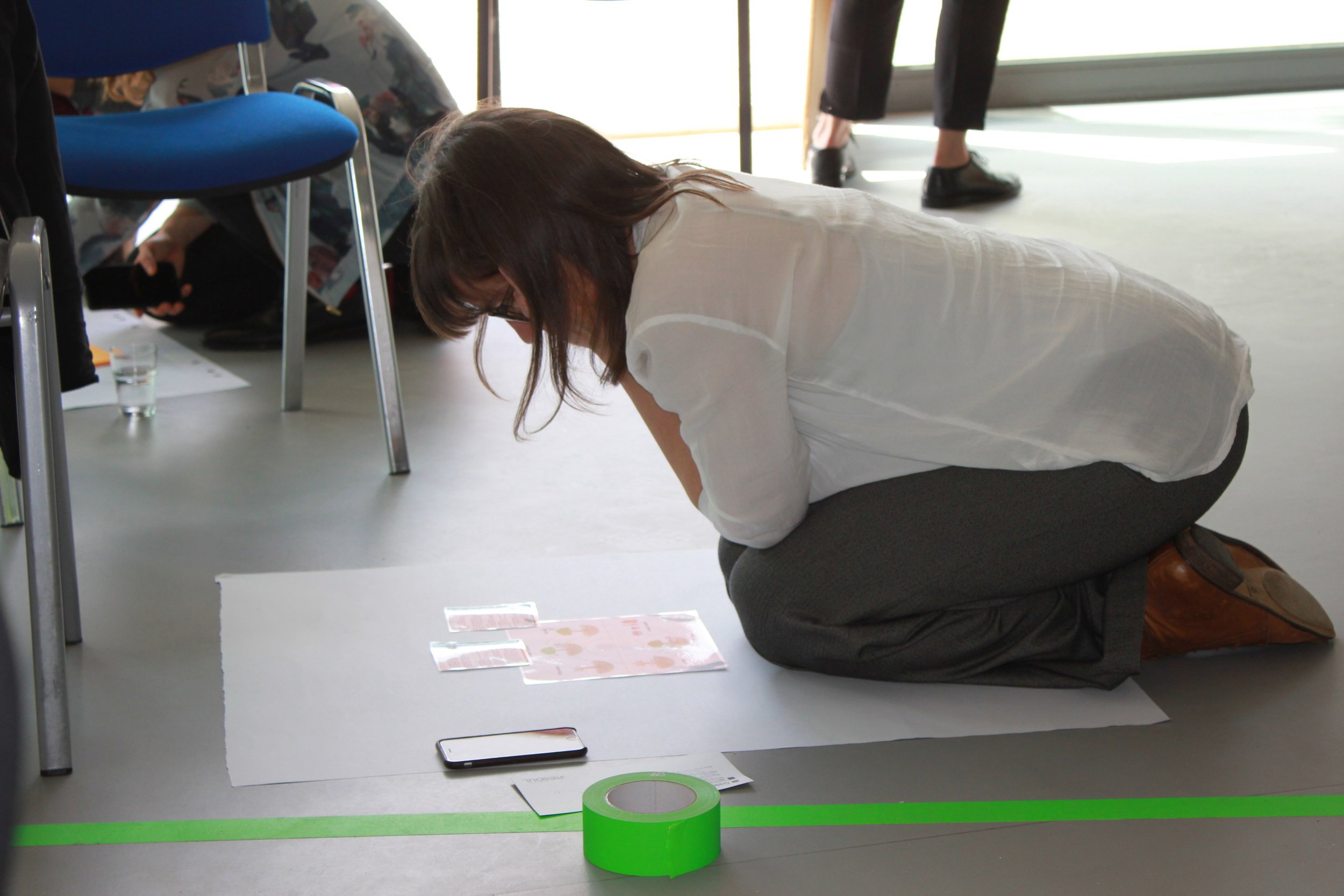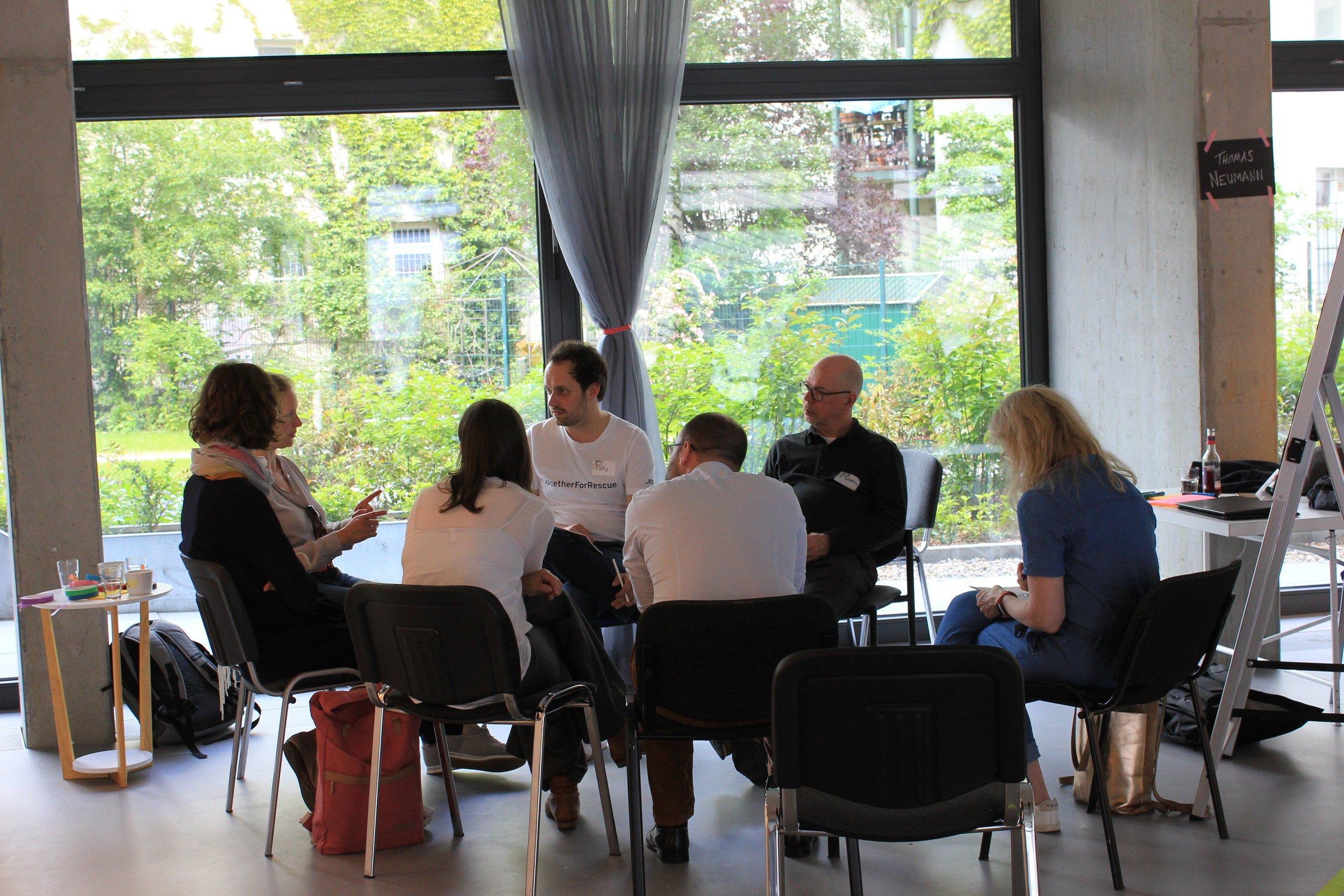RESOULsessions Vol. 3
May 22, 2019 — Anne Siemen
The RESOULsessions Vol. 3 are behind us and slowly we all find our way back into the week freshly refreshed and full of new inspiration and approaches.
Over the course of the day, 15 very different key-notes, workshops and resonance sessions took place, inside and outside our inspiring location feldfuenf in Kreuzberg. You can learn more in our Session Guide.
Thank you to all of you who made the sometimes long journey to Berlin to discuss, challenge and develop organizational SOUL topics with us. It was a party! Here are a few photos to remember it by.
What our guests say
I thought it was very cool that we all showed ourselves and also dared to address personal topics - where everyone also showed where challenges lie in their own work, where perhaps something didn't go so ideally, what could be done differently... in other words, this point of also looking at the not so nice side, which one otherwise doesn't like to look at so much. The fact that everyone who took part in the discussions was so open touched me on the one hand, and on the other hand, that's what I get the most out of. That was really cool!
— Niko
I think people here resonate on a similar frequency, even though they cover completely different topics. It's insane how many people I've met who I've either been in the same organization with, or with whom I think about the same topics, or with whom I've arranged to think about new topics together. Something is happening here that is working extremely well. Very enriching!
— Anne
I found the format super! The sessions and the conversations in between gave me a lot of inspiration, new perspectives and impulses. I realize feeling at home, because you meet similar people with the same attitude. I'm looking forward to the next time and will bring a topic for a session!
— Julia
I think it's great that you create a space where knowledge can be passed on, topics can be discussed or simply questioned and be inspired again; but above all that you bring people together. Just take a day to talk to nice people and get in touch with them.
— Lisa
The biggest challenge for me today: you have to choose between five offers per timeslot at the end. That's a bit painful in my opinion!
— Anne-Katrin
Thank you for the stage you set! They are great people you meet, great content. And the atmosphere has a special quality of warmth and openness and - yes - soul!
— Amadeus
Session Guide
ABUNDIGAI
Lisa taught how to use the abundance principles of nature for project management (info at www.abundigai.com; downloadable materials). Nele, Cornelius, Anne, Helene and I worked intensively and got fully involved in the topic. In the end, we all had learnings, including:
The method sensitized us to the fact that in our projects we should not only focus on setting up the project and carrying it out, but should also pay attention to further utilization and refinement of the "fruits" when harvesting, but also, as the tree does, plan time for rest and gathering strength (reflection, etc.). Accordingly, abundance means creating value without creating lack in other places or prioritizing what has potential, not what is too little.
— Daniela
Soul in the middle class
Ilka wondered how to place more soul in medium-sized companies. While there are many bright minds working there who are also open to new approaches, the long tenure with the company and therefore strong loyalty to the personality of the founder and the tradition of the company often makes it difficult for them to venture down new paths. Together with Dorothee, Sally, Simone, Maria and me, we shared our experiences and found out that especially founding personalities tended to be progressive, innovative and creative in their time and that one is well served to look at new approaches from their entrepreneurial perspective in order to get more courage to change. In addition, medium-sized companies in particular are well networked with one another and can therefore use the exchange not only for technical aspects, where there is often already a good connection to the state of the art, but also in terms of organizational development. Last but not least, we have had good experiences with not changing the organizational structures right away, but working on familiar, technical topics methodically with SOUL (consent method, sociocratic employee discussion, cross-hierarchy problem-solving teams...). This is how tangible differences emerge. Exciting exchange, good question and useful approaches, thank you.
— Ewa
Is the revolution eating its children?
Is it all digitalization or what - what will we as consultants, trainers and coaches (still) be needed for in 10 years' time?
Georg took us (Monika, Anne-Katrin, Achim, Maria, Stephan and me) on an exciting journey into the future and put up for discussion what our job will look like in 2030. It is already apparent that apps such as Punketta are being programmed or thousands of learning videos are being offered as a package for development measures that currently mainly take place face to face. What will happen when artificial intelligence gets even better and there are more creative offerings in this direction?
We are sure that we will continue to be needed for coaching, training, workshops, organizational development processes, etc. However, we will probably have to specialize more and be confronted with the particularly tricky cases. But it is hard to imagine that real interpersonal interaction can be completely replaced by artificial intelligence - soulorganizations will continue to be important!
— Johannes
Meaning in life
This session was given by Christoph from Munich. Julia, Xenia, Amadeus and I participated. First we clarified that it is about "the meaning in life" and not "the meaning of life": Meaning as a path/journey, a meaning we (subjectively) attach to someone or something. Next, the 4 factors of meaning fulfillment were presented by Tatjana Schnell (professor on the topic of meaning research), which is about the components of "coherent, meaningful, orientation and belonging". In a round of resonance, we found that today, information overload, complexity, role diversity and expectations make it more difficult and complex to find meaning in life compared to fewer job profiles in the past. Afterwards, the meaning pyramid (according to Tatjana Schnell) and 26 life meanings were discussed, which can also be used well in coaching in the form of meaning cards.
— Lynn
Art of Hosting
Thank you, Lisa, for your introduction to "The art of hosting"! It's exciting to see that a lot of it already works when the right people come together: good self-control, feeling completely like a guest, but also taking responsibility for a good event. It will take me a while to warm up to the wickedquesiongame, but the designforwiseraction will be tried out at the next opportunity. Thanks in this session also to Stephan, Lynn, Nina, Dorothee, Christoph, Lars, Miriam, Alexander, Henning, Xenia and Ewa!
— Johannes
Unified understanding of leadership
Anne-Katrin, Manuel, Christoph and I had an inspiring and intensive exchange on our own experiences and discussions in this session. WHY is it important to develop a unified understanding of leadership and do we absolutely need "unity" in understanding? Who would even notice a change? Leadership guidelines provide orientation, guide action and create identity. Authenticity creates trust and ultimately this security and satisfaction also has an effect on productivity. In the course of the development process, it becomes clear what the actual result of a common understanding of leadership is: leadership competencies, attitudes, guidelines, mission statement, etc. WHAT can we do in concrete terms to develop a common understanding of leadership? We discussed which target groups and formats are helpful to get people specifically involved in the dialog on the topic. If we find out from top management what their exact view and attitude is on the topic of "leadership" ("what is the DNA of the organization"), managers and employees can take a concrete position on this ("value match") and add further aspects. A nice result could be different "worlds/scenarios" within the framework of a large map, which not only gives direction and orientation to the entire organization, but is also the basis for leadership instruments based on it.
— Maria
Difficult people
In this session, as a first step, we shared situations in which we currently or in the past had to struggle with "difficult people" for us. Of course, we all kept emphasizing that the fact that someone feels "difficult" to us always has something to do with us. Ela, who is often confronted with really difficult situations in her everyday professional life as a therapist, put this into a different light for us again - people are sometimes "difficult" and it doesn't always have to be because of us. The crucial thing is to understand the other person and to adapt the way we deal with him/her accordingly.
Achim, Helene, Sally, Ela, Amadeus and I agree:
Diversity is a kick-ass resource, but it's also suck-ass exhausting.
It's helpful to understand the game level and respond at the motive level.
A source for good strategies: Rainer Sachse (various books).
— Maria H.-L.
What's next...?
Cornelius stretched a frame in which what was in the room through the participants and the environment was allowed to come into the room.
We entered with a check-in, preceded by a minute of mindfulness. Cornelius then introduced pairs of opposites of human needs. During the subsequent tandem walk, we took turns speaking to the need that resonated most strongly with each participant.
Methodology of the walk: The pairs took turns to talk about their respective needs. Every three minutes, they switch. One talks, the other listens. Each person stays with himself or herself while telling the story and does not refer to what the other person has said. After three rounds, the group met again and did a round of feedback on what they had experienced, from which the next step was derived. For 15 min. everyone lay down in the park for themselves. After reconvening, we went back together, in silence, to the large group.
Key learnings from the session were individual. We did not share it in the group. All participants were very much with themselves and used and enjoyed the session for their own reflection.
— Nele
Soulful Talent Management?
This session was facilitated by Lynn. First there was input with slides on definitions around talent management and then examples on components of how to bring more soul to an organization through talent management. Soul, defined here as a place where people can show themselves and their talents, something holistic. Components presented were self-determination (ownership, self-nomination for programs, pools, self-organization in peer formats and groups), soulmates (the importance of building relationships, sharing, networking, collaborating), sharing (sharing knowledge and resources, leveraging existing talent/expertise and but also thinking outside the box and sharing with other companies), and the topic of transparency (about processes, definitions, programs, and for example. e.g. salaries) in order to create trust.
Thanks for your ideas, suggestions, contributions to the discussion and the good mood: Simone, Nina, Xenia, Dorothee and Amadeus!
— Lynn
How much soul would you like?
Nele led us into an exciting discussion based on two very different case studies. How much soul would you like? At the end of the session, Achim, Sally, Christoph, Miriam, Nele and I were able to take away the following key learnings:
Transparency to the client: "When you work with me, I create spaces where something can really move for the participants - with all the consequences."
Conflict in attitude between "caring for the participants" vs. "self-responsibility of the participants".
If there is real movement in the group, inform the client early and offer accompaniment.
For us: stay mindful of what we can trigger.
It was exciting in this session that our role, our responsibility in processes in which something REALLY moves in the participants was seen and discussed quite controversially.
— Maria H.-L.
Trust in organizations
Moni and I worked on the topic of 'trust' in organizations in an exciting dialogue, using our own event as an example. The realization was that it takes a critical mass of people with a shared helpful, appreciative, authentic, benevolent attitude to create a nurturing field. 'Be real' is not an agency marketing slogan. Attitude is the core theme. You could feel that today.
— Stephan
Neuroscience meets organisational practice – lost in translation?
How can knowledge transfer from science to practice be more successful?
In the combined session, where Daniela hosted the first part and Manuel and Henning hosted the second part, Helene, Alex, Maria, Ewa, Julia, Lisa, and I participated.
Start: Insight into the functioning of the brain and the complexity of neuropsychol. research design. Core question: To what extent can such neuropsychological findings, obtained under highly controlled conditions, be transferred to organizational topics such as leadership/change? Conclusion: many proponents of the current neuro-hype act in a highly selective and simplistic manner, liberally transferring to completely different, more complex contexts. It seems to be more of a hip marketing tool of choice to suggest (pseudo) objectification in hard-to-measure markets. Social Affective Neurosciences can serve as inspiration, but are not directly transferable to our work. It makes much more sense to bring existing, very good research from e.g. social psychology more systematically into organizations. Another finding: emotions are extremely relevant for behavior change, we can use that. Concrete step for the science-practice interface: A dedicated section in our :R newsletter that translates relevant research findings for practitioners.
— Lars






























































